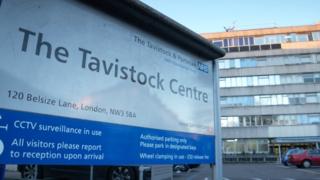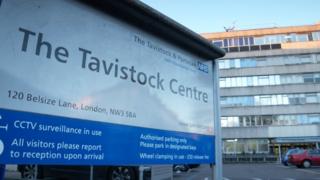NHS use of puberty blockers legal challenge begins
A mother and a nurse launch a legal challenge over the use of drugs to delay puberty. …


Legal action is being launched against the NHS over the prescribing of drugs to delay puberty.
Papers have been lodged at the High Court by a mother and a nurse against the Tavistock and Portman NHS Trust, which runs the UK’s only gender-identity development service (Gids).
Lawyers will argue it is illegal to prescribe the drugs, as children cannot give informed consent to the treatment.
The Tavistock said it had a “cautious and considered” approach to treatment.
Referrals up
The nurse, Sue Evans, left the Gids more than a decade ago after becoming increasingly concerned teenagers who wanted to transition to a different gender were being given the puberty blockers without adequate assessments and psychological work.
Since then, she says, even younger children are being given the drugs, which block the hormones that lead to puberty-related changes including periods and facial hair.
The number of young people referred to the Gids rose from 678 in 2014-15 to 2,590 in the past year.
Of these 2,590:
- more than 1,700 wanted to transition to male
- 624 wanted to transition to female
- most were in their early to mid-teens
- 171 were under 10
Ms Evans said: “I used to feel concerned it was being given to 16-year-olds.
“But now, the age limit has been lowered – and children as young as perhaps nine or 10 are being asked to give informed consent to a completely experimental treatment for which the long-term consequences are not known.”
‘Too young’
The mother, known only as Mrs A, has a 15-year-old with autism who is on the waiting list for treatment at the Gids.
She told BBC News her child presents to the outside world as a boy but, while she is happy to allow that, she is extremely concerned about the possibility of drugs that are not fully understood being prescribed.
“I’m worried that they will look at her age and say, ‘Well, she still says this is what she wants and therefore we will put her on to a medical pathway,'” Mrs A told BBC News.
“And given her communication of what she feels internally is slightly different because of her autism spectrum, I worry that what she says and what she means are often two different things.”
What are puberty blockers?
They are drugs which can pause the development of things like breasts, periods, facial hair and voice breaking
They can be prescribed to children with gender dysphoria who feel their sex at birth doesn’t match up with their gender.
This is meant to give them more time to weigh up their options before they go through the physical changes of puberty.
Although puberty blockers are described by the NHS as reversible, Gids acknowledges that their impact on brain development and psychological health is not fully known.
Read more: What are puberty blockers?
Mrs A said here child was too young to really assess the potential impact of puberty blockers on the rest of their life, including such things as fertility.
“As an adolescent, what we think will make us happy is not necessarily what will make us happy,” she told BBC News.
“It might help us in the short term – but it might not help us in the long term.”
‘Rated good’
A Tavistock and Portman NHS Foundation Trust official said: “It is not appropriate for us to comment in detail in advance of any proposed legal proceedings.
“The Gids is one of the longest-established services of its type in the world with an international reputation for being cautious and considered.
“Our clinical interventions are laid out in nationally set service specifications.
“NHS England monitors our service very closely.
“The service has a high level of reported satisfaction and was rated good by the Care Quality Commission.”

